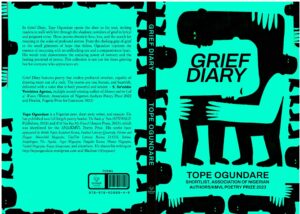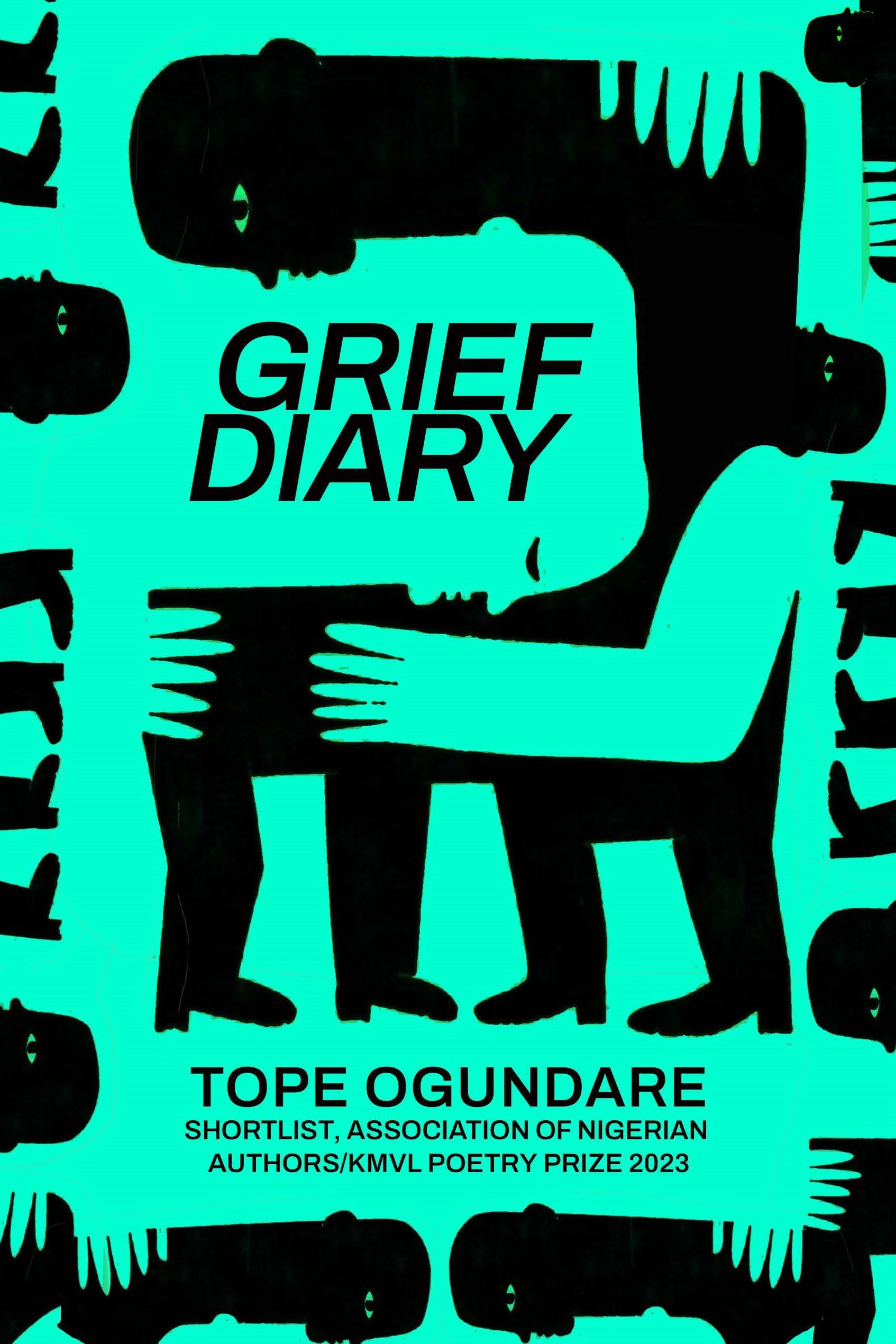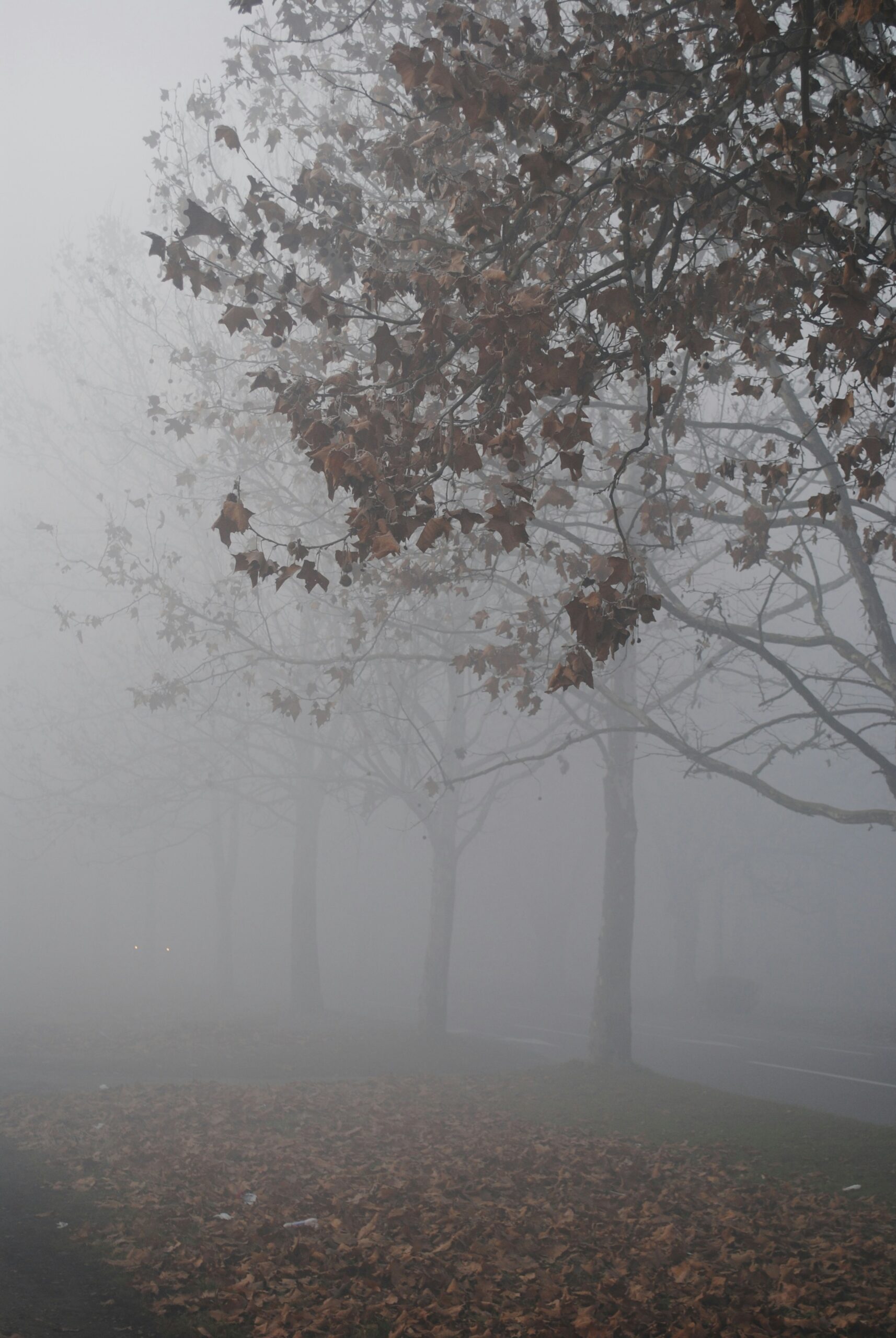Is there a way that one’s grief can loom so large it becomes a flood that can only be released through poetry? Can this be seen in reflections about the loss leading to that grief and a conversation with the one lost? The answer is Yes on many counts, and the evidence abounds in classic works from John Donne to Robert Frost, and on our African front, Antjie Krog, Kofi Awoonor (mainly in ‘Had Death Not Had Me in Tears’) and S. Su’eddie Vershima Agema in his Bring Our Casket Home: Tales one shouldn’t tell. It is this yes that Ogundare also looks at in his book which fuses personal loss with the broader Africanist understanding of death, memory, and continuity.

The collection largely revolves around the loss of the mother of the poet-persona, who in turn creates a conceptualisation of death that can be seen as a passage rather than an end. In typical traditional African thought, death is not seen as an end or severance of ties between the living and the dearly departed but a transformation. It reconfigures those relationships, transforming the deceased into ancestors who continue to exert influence. This notion of filial transformation resonates throughout the collection, where the poet often speaks to his mother in the present tense, as though she remains accessible beyond the physical realm. Lines such as “she didn’t say goodbye. she said goodnight. it is still night” reinforce this.
The diction of Grief Diary operates at an intersection of African and Western literary influences. While mainly written in English, the language carries indigenous nuances evident in many instances through select imagery and symbolism.
The poem “olubi” references Yoruba naming traditions, where names are not mere identifiers but encapsulate histories, prophecies, and destinies, as one notes in most of our traditions. In this way, Ogundare employs nomenclature as an extension of identity and remembrance, ensuring that even in death, the names of the departed continue to bear witness to their existence. The collection’s use of metaphor—particularly its reliance on nature to depict emotions—also aligns with local poetic traditions, where the human experience is often interwoven with the environment. Rivers, winds, and trees are not mere backdrops; they are active participants in the mourning process, symbolising the cyclical nature of life and death.
Another compelling feature of Grief Diary is its negotiation of modernity and tradition. Ogundare’s experience of grief is not bound solely within an African space but extends into a diasporic consciousness. The poem “on this day two years ago” captures the dissonance of mourning from a distance—a condition many Africans in the diaspora can relate to. The image of receiving devastating news while being thousands of miles away, in a different cultural context, highlights the fractures that migration imposes on traditional mourning practices. Where once grief would have been processed within the physical embrace of kin, the poet must now grapple with it in isolation, underscoring the alienation that often accompanies displacement.
Furthermore, Grief Diary subtly critiques the erosion of African mourning customs in the face of globalisation and Western influences. When you read the poem “when they ask you to get over your grief, you learn to hide it”, you notice the pressure to conform to Western ideals of emotional regulation. This contrasts the elaborate mourning periods observed in many African cultures with western paradigms of bereavement often emphasise stoicism and the need to ‘move on.’ Ogundare challenges this narrative, insisting that grief cannot and should not be suppressed. Instead, it should be honoured, as African traditions dictate, through sustained remembrance and ritualised mourning.
In many African cultures, grief is communal, a burden to be shared, often expressed through wailing, song, and poetic lamentation. Ogundare channels this communal grieving through his verses, ensuring that his sorrow is not isolated but rather resonant with the reader. The repetition of phrases, the cadence of lamentations, and the invocation of natural elements echo the dirges and elegies performed in traditional funeral rites. The poem “wait for me— a dirge” follows the structure of call-and-response, which one observes in communal mourning.
Perhaps the most striking element of Grief Diary is its invocation of the matriarchal figure as both a personal and cultural loss. The poet’s mother is not just an individual; she is an embodiment of heritage, strength, and sacrifice. The Igbo philosophy seen in several names, most prominently in ‘Nneka’ showing the supremacy of mother, amplifies this. In our societies, mothers often hold central roles as nurturers, moral compasses, and keepers of tradition. The poem “elegy for mother” frames the poet’s loss as a disruption to this lineage, mourning not just the woman but the wisdom and cultural continuity she represented. This aligns with the broader Africanist theme of generational knowledge transfer, where the loss of an elder signifies not just personal grief but also the loss of accumulated ancestral wisdom.
Ultimately, Grief Diary is a deeply African text, not merely because of its content but because of its structure, language, and worldview. It honours the African philosophy that the dead do not disappear but remain interwoven with the living. It embraces the belief that grief is not an isolated event but a collective experience that extends beyond the individual to encompass community, ancestry, and even the natural world. Ogundare’s collection is both a personal lament and a cultural statement—one that asserts the resilience of African mourning traditions in an ever-changing world. By weaving together personal sorrow with communal memory, tradition with modernity, and spirituality with reality, Grief Diary reaffirms the Africanist ethos that no one grieves alone and that the departed never truly leave.
Acclaimed author, scholar, filmmaker and poet, PROFESSOR HYGINUS EKWUAZI has earned numerous awards in poetry and fiction, as well as several credits in film. He is renowned for his poetry collections among which have won significant prizes including the Association of Nigerian Authors-Cadbury Prize 2007 & 2010; ANA-Gabriel Okara/NDDC Prize 2008; and nominations for the [NLNG] Nigeria Prize for Literature as well as the Soyinka Prize for African Literature 2012.
- THE AFRICAN [SUB]TEXT IN OGUNDARE’S GRIEF DIARY: A REVIEW by Hyginus Ekwuazi - April 10, 2025
- What ‘Nigeria Meets Sweden: An Intercultural Cookbook by Philippe Glago’ Shows: A Review by Soji Cole - March 13, 2025
- SEVHAGE and Konya Shamsrumi presents The Poetry Club UDUS Anthology 2025 - February 11, 2025













Leave a Reply